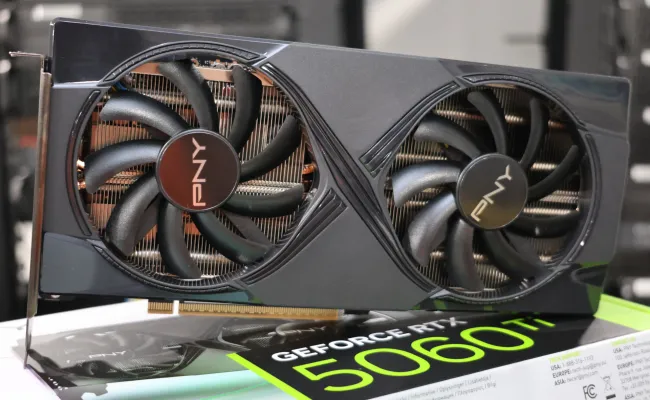Yesterday NVIDIA announced the GeForce RTX 5060 “Blackwell” graphics cards as their new, most affordable offering of the RTX 50 series. While the $299 GeForce RTX 5060 isn’t shipping until next month, today the GeForce RTX 5060 Ti 8GB goes on sale for $379 USD and the GeForce RTX 5060 Ti 16GB is also hitting Internet retailers today and starting out at $429 USD. I’ve been testing out the GeForce RTX 5060 Ti 16GB the past several days under Linux and have initial GPU compute benchmarks to share today.
With the GeForce RTX 5060 pricing starting out at $299, it’s the most affordable Blackwell desktop graphics card to date though will be interesting to see the retail availability of these RTX 5060 series graphics cards moving forward. The GeForce RTX 5060 series still aim to deliver very nice generational uplift for those sticking to the GeForce x60 class graphics cards.
The NVIDIA GeForce RTX 5060 Ti features a 2.41GHz base clock with 2.57GHz boost clock, GDDR7 video memory on a 128-bit interface, 4608 CUDA cores, and its AI tensor cores are rated for 759 AI TOPS while its ray-tracing cores are rated for 72 TFLOPS.
The NVIDIA GeForce RTX 5060 Ti graphics cards require a single PCI Express 8-pin power connection or a PCIe Gen 5 cable depending upon the graphics card AIB model. The total graphics power rating on the GeForce RTX 5060 Ti is rated for 180 Watts.
For this launch-day testing of the NVIDIA GeForce RTX 5060 Ti, NVIDIA kindly sent over a review sample of the PNY GeForce RTX 5060 Ti 16GB graphics card. This PNY graphics card is a dual fan, dual slot model and featuring a traditional 8-pin PCI Express power connector.
With the NVIDIA GeForce RTX 5060 Ti, I was using the NVIDIA 570.133.07 as the newest driver release available as of testing. On this public 570.133.07 driver, the RTX 5060 Ti was simply identified as a “NVIDIA Device” but all of the display functionality and other basic features were working. The OpenCL and CUDA compute support was working fine with the RTX 5060 Ti on this driver, but like the other RTX 50 Blackwell GPUs when tested in the pre-release period, this wasn’t yet a game-optimized driver. Like with those other RTX 50 graphics cards, the RTX 5060 Ti gaming performance was artificially low. With the next public NVIDIA Linux driver release bearing official RTX 5060 series support, it should be game-ready at that point.
Thus for the testing today is just looking at the RTX 5060 Ti Linux GPU compute performance. A follow-up article will look at the NVIDIA RTX 5060 Ti Linux gaming performance upon having an officially supported driver release.
The NVIDIA graphics cards tested for this initial CUDA/OpenCL Linux GPU compute comparison included:
– RTX 4060
– RTX 4070
– RTX 4070 SUPER
– RTX 4070 Ti
– RTX 4080
– RTX 4080 SUPER
– RTX 4090
– RTX 5060 Ti
– RTX 5070
– RTX 5080
– RTX 5090
Unfortunately I never had received a review sample of the GeForce RTX 4060 Ti which is why that part isn’t included as part of this comparison. A wide variety of NVIDIA Linux GPU compute benchmarks were carried out under Ubuntu 25.04 with Linux 6.14 and the NVIDIA 570.133.07 across all tested graphics cards for seeing how the NVIDIA GPU compute performance is generationally for the performance as well as power efficiency. Again, stay tuned for the NVIDIA/AMD Linux gaming benchmarks once the next NVIDIA driver release is available with proper game-ready support for the RTX 5060 Ti on Linux.







I am NOT a fan of Nvidia although I run a couple cards. I prefer AMD (ATI) cards and CPU’s. I am also not a fan of PNY, necver had any luck with them, they always went out way too soon. I prefer to buy MSI and eVGA when possible.